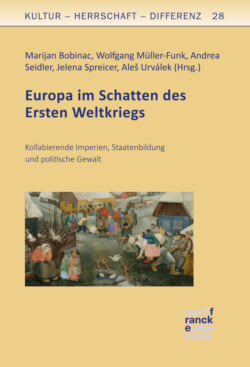Читать книгу Europa im Schatten des Ersten Weltkriegs - Группа авторов - Страница 19
На сайте Литреса книга снята с продажи.
Violence and Rhetorical Strategies in Sigmund Freud’s Study Beyond the Pleasure Principle (1919–1920) and Anna Akhmatova’s Selected Poems (1917–1924)
ОглавлениеFatima Festić (Amsterdam)
The short preface to Anna Akhmatova’s1 Requiem,2 which she wrote more than twenty years after she completed this elegy, appeared to me as a cathartic enactment of the invigorating poetic witnessing to the dignity of people exposed to state violence. I will quote this preface, or as Akhmatova put it “Instead of a preface” (“Вместо предисловия”), in my own translation.3
In the dreadful years of the Yezhov’s4 terror, I spent seventeen months waiting in line outside the prison in Leningrad. One day, somehow, somebody in the crowd “recognized” me. Then, a woman, standing behind me, her lips blue with cold, who had, of course, never heard me called by name before, moved out of the numbness weighing down on us all and asked me, whispering to my ear (everyone whispered there):
“You can describe this?” (А это вы можете описать)?
And I said (И я сказала):
“I can.” (Могу.)
Then, something like smile passed briefly over what had once been her face.
(Leningrad, April 1, 1957)
I read these lines for the first time after I completed my dissertation on witnessing, violence, and artistry (in 1998),5 upon the turn-of-the-century wars in Bosnia-Herzegovina and Croatia. Already then, this Akhmatova’s retrospective Instead-of-Preface6 to her Requiem recalled to me – although in inversion – the structural dynamics of Sigmund Freud’s essay Beyond the Pleasure Principle,7 which in my work I interpret as a foundational text of postmodernism. That is, the difference in narrative strategies of these two authors appeared to me as making a crucial point. Then, keeping to my belief that the most an author can do is admit the very position from which she or he starts to think, and starting to read closely Akhmatova’s earlier poetry8 – and specifically the poetry of her transition from ravishing lyric subjectivity to profound social commitment to witnessing (here, I offer my own selection from the poems that Akhmatova wrote between 1917 and 1924, as pertaining to the discussion topic)9 – I found yet another proof that this confessing authorial quality is much more inherent in a feminine account10 than a masculine one.
In my contribution to this book collection on the post-Great War violence, I discuss the ways in which Freud and Akhmatova each deal textually and strategically with their encounter with violence and death that interrupted their linear lives, after crashing and burying many of their contemporaries in the Great War and its immediate aftermath. In their “witnessing writing”, they have opened the rhetorical horizons for generations of scholars to come. In feminist criticism, Freud was reproached fiercely for annulling the woman’s voice and presence in this text (of his deceased daughter Sophie) in his self-curing narcissistic cathexis while he formulated the death drive after the repetition compulsion. Hence, I discuss Akhmatova’s strong woman’s voice that poetically and dialogically reflects on the violence of the dissipating worlds.
If these two authors are read simultaneously – relative to their socio-physical positions in two emerging post-imperial, yet different political structures (and with the application to their works of the analytic terms of ‘cathexis’11 and ‘transference’12) – the course of the narrative disclosures of Akhmatova in her poems can be seen as if working through the overt self-protection of Freud’s narrative revelation of repression, repetition, and drive. Henceforward, the discussion could hint toward the claims that understanding of drive13 is also informed by gender, as it is also the understanding of the dreadful materializations of drive within the radical political imaginaries that shaped the realities of these two authors.
